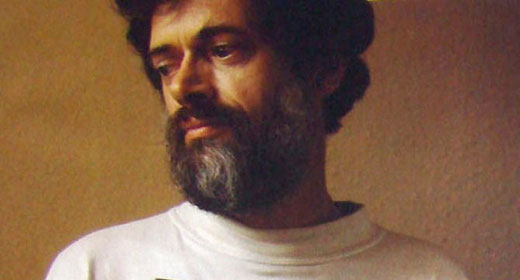by Kristoffer Henriksen: Top-level athletes are not only strong and fast, but they also look totally focused as if,
 in the moment of performance, the world around them does not exist. In the early days of sport psychology, this led to two misconceptions. First, we thought that when athletes looked calm and confident, their minds were quiet and positive. Second, we thought these people were born with extraordinary minds. Today, sport psychologists know better. We know the mind is busy and even the best athletes experience unpleasant thoughts and doubt at times. We also know that athletes can learn to refocus on the task at hand. They can do so by practicing mindfulness, which is training their attention to stay in the present moment, by bringing it back when it wanders. It is like taking the mind to the gym. In this article, I will explain how mindfulness training helps athletes perform at their best.
in the moment of performance, the world around them does not exist. In the early days of sport psychology, this led to two misconceptions. First, we thought that when athletes looked calm and confident, their minds were quiet and positive. Second, we thought these people were born with extraordinary minds. Today, sport psychologists know better. We know the mind is busy and even the best athletes experience unpleasant thoughts and doubt at times. We also know that athletes can learn to refocus on the task at hand. They can do so by practicing mindfulness, which is training their attention to stay in the present moment, by bringing it back when it wanders. It is like taking the mind to the gym. In this article, I will explain how mindfulness training helps athletes perform at their best.
Inside the Mind of a World-Class Athlete
Let me start by inviting you inside the mind of a world-class athlete. Imagine an Olympic sailor. Over the last 10 years, she has trained hard in pursuit of one goal: Olympic glory. Now she is at the Olympics and the dream is within reach.
The competition takes place over 6 days, with two races every day. The first 5 days have gone well. She is in the lead, but the other sailors are close behind, and a medal is by no means guaranteed. The morning of the final, she knows exactly what she must do in today’s race. She must observe the winds closely and sail with good technique—then she can win. Winning will require her to be totally focused on the present moment, concentrated on the task.
She knows this, but she is nervous. Two times this year she has been in the lead, only to be overtaken in the final. As today’s race begins, her start is not very good. Inevitably, thoughts about her previous losses come creeping in. Her attention wanders from the present moment to the past (“What did I do wrong?”) and on to the future (“What if it happens again?”). While her mind wanders, she is not focused on the present moment. She misses a good puff of wind and forgets about technique. Luckily, she notices that her focus is not right and brings her attention back to where it needs to be.
She manages to reach the top mark as one of the first sailors. Back in the front group, she can almost taste the sweetness of success. Her mind wanders off to the future—to victory and national celebration. Daydreaming, she almost misses a very windy patch on the water. Again, however, she notices her mind is wandering and brings her attention back to the task. This happens many times during the race. At times she is almost celebrating, convinced that victory is in hand. At other times, panic, anxiety, and memories of previous defeats cloud her mind. Every time, she notices her wandering mind and brings it back to the present moment. This is something she has been training intensely. She continually reminds herself of her strategy and she goes on to win a medal.
Always Focused: An Unreachable Goal
You may be surprised to learn that even a world-class athlete and Olympic medal-winner struggles to stay focused. This is not actually so surprising. The human mind is equipped with extraordinary powers, which are also a weakness. Humans can evaluate their mistakes to make sure they do not happen again. Unfortunately, it is hard for us not to constantly evaluate our performance. Humans can foresee problems before they occur, which is why we can do things like build safe bridges. Unfortunately, it is hard for us not to worry about all the things that could go wrong.
Athletes are human beings. Just like the rest of us, they are born with minds that are prone to wandering. Sometimes the mind wanders off to the past (“Why did I make that mistake?) Other times, it wanders off into the future (“If I win the next point, I will be world champion!”).
The mind wanders easily during moments of intense pressure [1]. Often, in sport, the outcome is highly uncertain. At the same time, that outcome has significant personal meaning. The Olympic games are a good example. For most athletes, success at the Olympics can mean financial rewards and eternal glory. At the same time, all the competitors are well-prepared and eager to win. No wonder athletes get nervous and find it hard to stay in the present moment.
Although the sailor we described is often distracted, she manages, again and again, to put her mind where it needs to be—on the task. She does this using the 3R process.
Her mind wanders, but the ability to refocus is a skill she has trained and perfected, like all her other sailing skills.
is a good tool for the job.

- Figure 1 – The 3R process.
- Coming back to the present moment starts with the ability to notice that the mind has wandered (register), followed by acceptance (release), to finally bringing the attention back to the task (refocus).
What Is Mindfulness?
Let us do a short mindfulness exercise. Read this description first and then try it.
Sit comfortably. Close your eyes. Notice your breath. You do not need to slow it down or change it in any way—just notice it. You may notice how your belly expands and contracts, or the feeling of air passing through your nose. Whenever a thought pops into your head, just notice it. Remember, “Why do I have so many thoughts?” or “This exercise is stupid!” are also thoughts. Try not to judge whether the thought is good or bad—just notice. When you notice thoughts, gently bring your attention back to your breath. Go ahead and do this for 1 min.
How often did your attention wander from your breath? How often were you distracted? If you are like the rest of us, probably quite often. This is also true for athletes. And, the more pressure a person is under, the more the mind tends to wander.
Mindfulness has been described as paying attention on purpose, in the present moment, without judgment [2]. That means being aware of what is going on both inside and outside of yourself, without getting lost in the thoughts that are always in your mind. Mindfulness is an ancient Eastern concept, and back then it had a religious purpose. Today it is also very popular in the West, but without any ties to religion.
In sport psychology, mindfulness is the ability to put attention where it needs to be. It is a very important skill that must be practiced so that it can be used when performing under pressure. Mindfulness training is an essential tool to help athletes develop the skill of mindfulness. Mindfulness training has been gaining popularity as sport psychologists have seen how even the best athletes experience intruding negative thoughts during their most important events.
What Does Mindfulness Do for Athletes?
Although athletes in competition look totally focused, as if the world around them does not exist, we know that their minds are busy. Even the best athletes experience doubt and worry. Luckily, they can learn to refocus on the task at hand. This ability to take charge of their attention in crucial moments of a performance is the most important psychological skill for athletes. Gandalf would say it is the one ring to rule them all.
If an athlete is not fully focused, their performance will suffer. A sailor may miss a windy patch. A football player may miss an opportunity for a brilliant pass because he does not see that a teammate is free. A boxer may react a second too slowly and be punched in the face. Tobias Lundgren and his colleagues taught mindfulness to a group of ice hockey players in Sweden and found that these players performed better at goals, assists, and shots taken, and that they were rated by their coaches as being more focused and committed [3]. Mindfulness simply helps athletes do their best.
At the same time, training mindfulness regularly is good for wellbeing. Through mindfulness training, athletes get to know their minds, accept how the mind works, and engage with what is important to them. As a result, they are less stressed and experience higher wellbeing. Athletes with high wellbeing are more likely to stay in sport.
How Can Athletes Train Mindfulness?
Like any other skill, mastering mindfulness requires training [4]. Athletes can train the ability to keep their attention in the present moment, bringing it back each time it wanders. It is like taking the mind to the gym. Mindfulness can be practiced formally and informally (Figure 2) [5].

- Figure 2 – Both informal and formal mindfulness training result in increased attention and awareness or, in other words, in a better ability to focus.
Informal mindfulness training means training awareness and attention while you are engaged in another task, like exercising by biking to school. For example, a sailor polishing his boat may bring all his attention to the sensation of polishing. Every time he thinks about what is for dinner, he gently brings his attention back to polishing. Or imagine a cyclist practicing mindfulness on her bike. She focuses all her attention on a smooth pedal stroke and practices her ability to bring her attention back every time a distracting thought pops up.
Conclusion
Like the rest of us, athletes’ minds are prone to wandering and losing focus. Teaching athletes to be fully present in the moment of performance and to maintain their attention on the task at hand can help them to perform better. Mindfulness training is an invaluable method for training athletes—and others—to keep their attention on the present moment, which helps them to attain maximum performance and wellbeing.
Glossary
3R Process: ↑ A mindfulness in action process that consists of (1) registering that the mind has wandered, (2) releasing from the difficult thoughts or emotions and (3) refocusing on the task.
Mindfulness: ↑ The ability to pay attention, on purpose, to the present moment, without judgment or reaction.
Formal Mindfulness Training: ↑ Setting aside time to train, for example through a meditation exercise.
Attention: ↑ The ability to focus on one thing (often the task at hand).
Awareness: ↑ The ability to notice when attention wanders and bring it back.
Informal Mindfulness Training: ↑ Training while engaged in another task.
Conflict of Interest
The author declares that the research was conducted in the absence of any commercial or financial relationships that could be construed as a potential conflict of interest.
References
[1] ↑ Henriksen, K., Hansen, J., and Larsen, C. H. (Eds.). 2020. Mindfulness and Acceptance in Sport: How to Help Athletes Perform and Thrive Under Pressure. New York, NY: Routledge.
[2] ↑ Kabat-Zinn, J. 1994. Wherever You Go, There You Are. Mindfulness Meditation for Everyday Life. New York, NY: Hyperion.
[3] ↑ Lundgren, T., Reinebo, G., Fröjmark, M. J., Jäder, E., Näslund, M., Svartvadet, P., et al. 2021 Acceptance and commitment training for ice hockey players: a randomized controlled trial. Front. Psychol. 12:685260. doi: 10.3389/fpsyg.2021.685260
[4] ↑ Hansen, J., and Haberl, P. 2020. “Helping athletes be present when performing under pressure,” in Mindfulness and Acceptance in Sport: How to Help Athletes Perform and Thrive Under Pressure, eds K. Henriksen, J. Hansen and C. H. Larsen (New York, NY: Routledge).
[5] ↑ Baltzell, A. L., and Summers, J. 2017. The Power of Mindfulness. Mindfulness Meditation Training in Sport (MMTS). Cham: Springer.









































